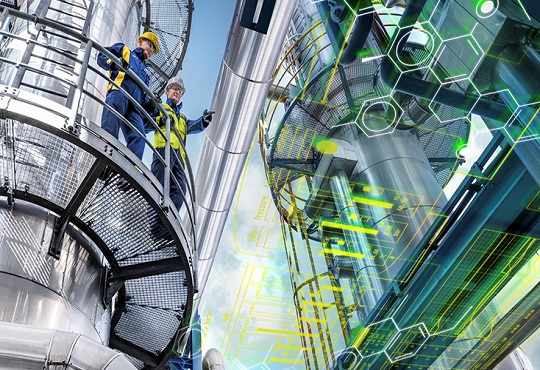
How IIoT is Reshaping the Chemical Industry
Vishal Pratap Singh | Sunday, 27 February 2022, 13:53 IST

The Industrial Internet of Things (IIoT) is an extension of the usage of the Internet of Things (IoT) in industrial sectors. IIoT can give the digital identity to chemical plant operations and the entire supply chain. It can help manufacturers identify and remedy poor performing equipment, quickly detect and track quality issues and monitor the chemical process from feedstock to finished product. For example, operators working in chemical industry often inspect equipment for anomalies and report their findings on a clipboard which is slow, costly and error prone.
Now, with the help of IIoT, operators can send that information to the cloud, have it analysed based on similar inspections and further compare it against data gathered from sensors to provide a full picture of equipment health for that particular type of asset. “IIoT can enable an individual to get automatic real world insights into the plant and can type and get a status instantly at a fraction of seconds”, says Sudip Mazumder, CEO of IIoT innovation leader, Prophecy Sensorlytics. The global industrial internet of things market size was valued at USD 216.13 billion in 2020 and is expected to expand at a compound annual growth rate (CAGR) of 22.8 per cent from 2021 to 2028.
Gives Accurate Advice
IIoT is capable to give perspective advice to chemical industry operators. Software can look at trends in production processes and equipment performance to recommend actions that are aligned with the organisation’s business objectives. These recommendations go beyond shutting down equipment or adjusting production processes. Chemical companies can now turn to IIoT solutions to help them make the best decisions when it comes to replacing versus repairing equipment. It helps them in knowing which maintenance and inspection tasks are unnecessary and wasteful. It also helps them to understand which production process is the most energy efficient.
Anticipates Maintenance Requirements in Advance
IIoT has the potential to take chemical companies to the next level. The data collected from IIoT enabled devices helps in predicting future outcomes and trends. It also allows anticipating maintenance requirements of machines on a factory floor. The data insights help in minimizing downtime and enhance equipment lifetime. The intelligent software solution enables chemical enterprises to respond faster to changes in the marketplace.
Reduces Complexity in Operations
Generally, most of the chemical companies focus only on the cost saving benefits of using IIoT. But there are ‘N’ numbers of ways to create value for customers. When there is a complex operation in a chemical plant, individuals expend a lot of effort to get efficient solutions while keeping high levels of safety and control. But what people lose sight of is that sometimes with improved insight and IIoT, one can improve their success in a way that also has customer impact.
IIoT can help in improving the speed with which one delivers its products. Chemical companies can also offer customers more options for their products or flexibility in production. Finally, it helps improve transparency with customers, so they know exactly the status of an order. That all has an impact on the top line, not just costs.
Automated Operations
IIoT is inextricably tied to the workforce of the future. By the year 2025, millennial generation or digital natives will make up 75 per cent of the global workforce. This implies that to attract and retain talent, existing business models within traditional manufacturing industries such as chemicals or mining will have to evolve and incorporate new technologies.
Incoming workers are quick learners and gear towards efficiency. They are not inclined to read thick instruction manuals to assimilate operational knowledge. Wisdom needs to be digitized, without which smartness cannot meet wisdom and younger operators run the risk of working in a plant without sufficient knowledge. As more and more operations in chemical industry are digitized, the results are multifold. Fewer workers are needed to work in a plant and safety level increases along with productivity. As more processes are automated progressively, workers can engage in higher value added tasks that are both safe and more technical.
Analyses Third Party Data for Improvement in Operations
The advantages of Industrial IoT are not just limited to one operational process or facility. After gaining more insights into operations and creating new value for customers, the next step is to layer in third party data. This allows a company to go upstream to suppliers to gather data about shipments and the supply chain or downstream to ask customers for data about how they use the products.
Scope in Future
IIoT will further revolutionize the chemical industry in the coming future. It will help in identifying, measuring and tracking parameters that help in ensuring the safety of workers as well as prevent machine failure. The Industrial Internet of Things (IIoT) applications will allow chemical manufacturing companies to streamline operations and promote strategic growth. Businesses can also monitor and analyse energy and other utilities consumed by critical processes to save operational costs.
CIO Viewpoint
7 Thoughts on Preparedness for a Slow
By Robin Joy, CIO, V-Guard
Securing your Cloud Infrastructure - A Journey...
By Vishal Katial, VP - Information Technology, Ugam
Achieve Information Security with Converged...
By Deena Dayalan K, Director- IT, Sears India
CXO Insights
Managing Life Cycle - Key for Sustainability
By Jaiganesh Murugesan, Sr. Director, IT for Engineering and Supply Chain, GE Transportation
Futureproof your business with lasting agility
By Subrato Bandhu, Regional VP, OutSystems
Common Pitfalls to Avoid While Managing...








